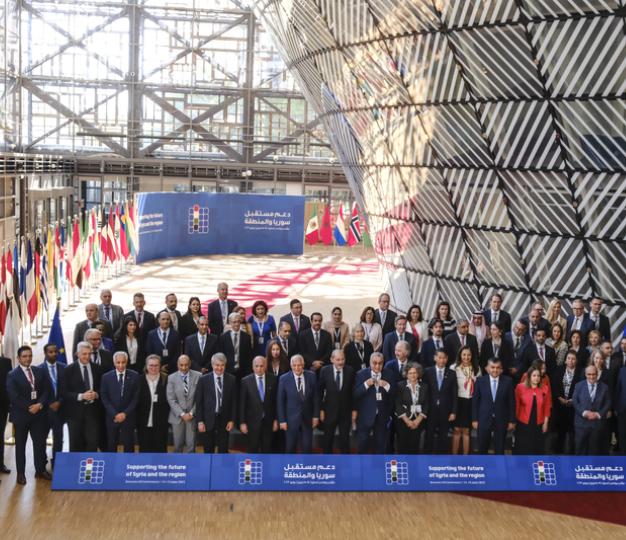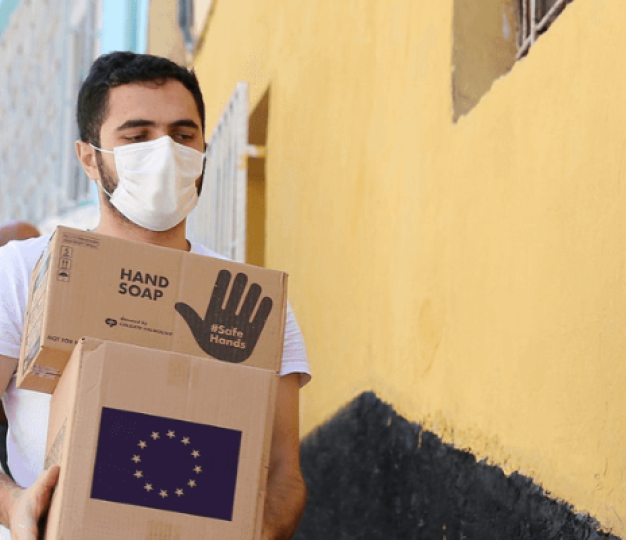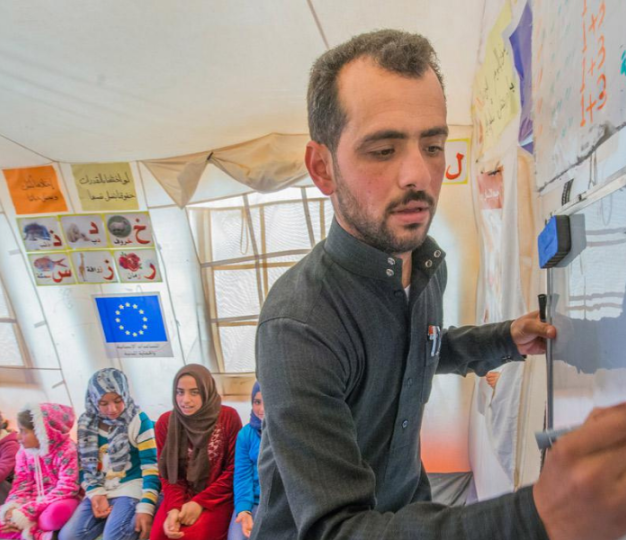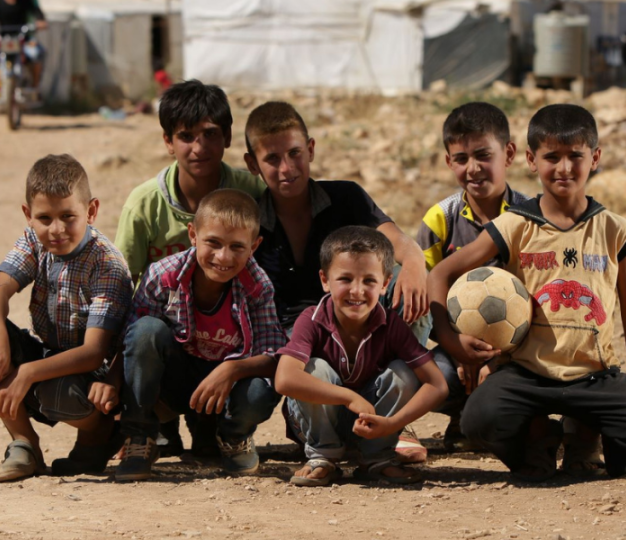The European Union and Syria
In this critical period for Syria, all Syrians should have the chance to participate in rebuilding their country. The European Union and its Member States stand with the Syrian people, support a Syrian-led and Syrian-owned inclusive political process, and are mobilising assistance and expertise across policy areas to that aim.
Since 2011, the EU and its Member States have mobilised around €37 billion in humanitarian, development, economic and stabilisation assistance, supporting Syrians both inside the country and across the region – making them the main donor. The EU remained steadfast in its commitment to the Syrian people, including through the organisation of the annual Brussels Conference over the past nine years, mobilising the international community in support of the Syrian people. The EU remains committed to supporting Syria on its path towards stabilisation and reconstruction, and in addressing its humanitarian needs.
Political Relations
From the start of the Syrian crisis in 2011, the EU suspended all bilateral cooperation with the Assad regime. Diplomatic relations remained strained throughout the conflict, and the EU Delegation moved to Beirut, headed by a Chargé d’affaires a.i. The EU imposed comprehensive sanctions on the Assad regime, including asset freezes and travel bans on key officials. The European Union mobilised all the tools at its disposal to help create the conditions for a better future for all Syrians.
The fall of the Assad regime marked the beginning of a new chapter for the Syrian people and the broader Middle East. During the current period of transition, the EU supports efforts to establish a Syrian-led and Syrian-owned process, with the support of the UN, aimed at ensuring a peaceful and inclusive transition. The EU has welcomed the transitional authorities’ commitment to build a new Syria based on national reconciliation, rule of law, separation of powers, as well as human rights and fundamental freedoms for all Syrians without distinction, fully safeguarding the diversity of the country. The EU calls for these initial commitments to be put into effect in line with international standards, allowing for the full, equal and meaningful participation of all Syrians in all spheres of political life and society. The EU stands ready to support the transitional government in these endeavours, including through the EU Delegation’s full reactivation in Damascus.
The EU continues to call for an immediate end to violence across Syria. It also continues to strongly support Syrian and international efforts towards accountability for all atrocities, committed mainly by the Assad regime and by other parties, such as Daesh and other terrorist or armed groups, during or since the Assad regime. A comprehensive and inclusive transitional justice process, Syrian-led and Syrian-owned, is a necessity for reconciliation and lasting peace in the country. All those responsible for grave breaches of international humanitarian, criminal and human rights law must be held accountable and brought to justice. In May 2025, the EU lifted all economic sanctions on Syria in order to support Syria’s inclusive political transition, as well as its swift economic recovery, reconstruction and stabilisation. The EU maintains sanctions related to the Assad regime in line with its call for accountability as well as sanctions based on security grounds. In parallel, the EU introduced additional sanctions against human rights violators and those fuelling instability in Syria.
The EU urges all external actors without exception to fully respect Syria’s unity, independence, sovereignty and territorial integrity. The EU condemns any unilateral foreign military actions and presence as well as attempts to undermine Syria’s stability and prospects for a peaceful transition. The EU also emphasises the importance of the fight against terrorism, the prevention of the re-emergence of terrorist groups, and the destruction of Syria’s remaining chemical weapons stockpiles.
Humanitarian Aid
The European Union has been a leading donor for providing humanitarian assistance both inside Syria and in the region, focused on addressing life-saving and life-sustaining needs. The assistance, coordinated by the Commission’s Directorate-General for European Civil Protection and Humanitarian Aid Operations (DG ECHO), is delivered through humanitarian partners, including international NGOs, UN agencies, the Red Cross and Red Crescent Movement and their local implementing partners. They provide the most vulnerable with health care, food assistance, water, sanitation and hygiene services, protection, shelter, education and livelihoods support. ECHO has also provided assistance for the needs of persons displaced by the conflict in neighbouring countries across the region.
As everywhere else in the world, ECHO Syria operates with great autonomy, based solely on humanitarian principles of independent, impartial, neutral and needs-based assistance. The ECHO Syria Country Office has presence in Damascus, Erbil, Gaziantep and Amman, which allows the EU to monitor and scale-up humanitarian aid operations inside Syria and to engage directly with humanitarian partners on the ground.
The EU also provides significant support to refugees and their host communities in the countries neighbouring Syria, namely Lebanon, Jordan, and Türkiye, as well as Iraq and Egypt. The EU maintains that, for now, conditions are not in place for the return of refugees and internally displaced persons in a safe, sustainable, informed, dignified and voluntary way.
Non-Humanitarian Assistance
Since 2011, the EU has provided non-humanitarian assistance in Syria for a total of EUR 500 million supporting bottom-up and community-driven interventions at local level with the aim to build resilience, address medium and longer-term needs and prepare the ground for Syria’s future. The EU’s Directorate-General for the Middle East, North Africa and the Gulf has been supporting and empowering Syrians across the country through a ‘Whole of Syria approach,’ working on education and vocational training, health, livelihoods, agriculture, Housing Land and Properties rights, as well as helping to fight against impunity, notably in supporting human rights and the efforts to address the issue of missing people.
Following the fall of the Assad regime, the EU’s objective is to support a peaceful, inclusive, Syrian-owned and Syrian-led political transition, laying the foundations for much needed socio-economic recovery and future reconstruction, also contributing to creating the conditions for the return of internally displaced persons and Syrian refugees. The EU is therefore stepping up its non-humanitarian assistance to Syria by supporting interventions aimed at strengthening the socio-economic recovery and resilience of the Syrian population. The core focus is on institutional capacity building; economic recovery through revitalisation of both urban and rural economies; and transitional justice, human rights and accountability.
The EU’s non-humanitarian assistance in Syria follows strict implementation parameters, robust risk monitoring and mitigation measures.
Support to Stability and Peace Building
The Syrian conflict is one of the largest areas for the EU’s crisis response actions, managed by the European Commission’s Service for Foreign Policy Instruments (FPI). Guided by the Council Conclusions on Syria adopted in June 2025, the activities aim to operationalise the EU’s commitment to stand with the Syrian people and to support a peaceful and inclusive, Syrian-led and Syrian-owned transition. These include:
-
Support to the transitional government by setting up foundations for recovery and reconstruction of Syria (including investing in mine action, removing unexploded ordnance and rubble clearance); supporting the reconciliation process; reigniting the multi-track mediation process; and tackling the spread of misinformation.
-
Support to national efforts on transitional justice as well as assistance to victims of sexual violence and support for missing persons.
-
Support to prevent further radicalisation in northeast Syria by providing camp management assistance in Al Hol and Roj camps, and contributing to an enabling environment for the return, rehabilitation and reintegration of vulnerable individuals, including in areas liberated from Da’esh by the Global Coalition; this includes carrying out activities such as mental health and psychosocial support, support for social cohesion, and life skills and vocational training, among others.
FPI’s projects are implemented in partnership with a wide range of actors, including international and local NGOs, EU Member State agencies, and UN organisations.
2025 Brussels IX Conference on 'Supporting the future of Syria and the region'
The European Union, together with its Member States, has been consistently leading in providing assistance and supporting the Syrian people. In this context, on 17 March 2025 the EU hosted the Brussels IX Conference “Standing with Syria: Meeting the Needs for a Successful Transition,” in order to address the immediate needs of the Syrian people and support an inclusive transition, following the fall of the Assad regime. The Conference brought together international partners, the UN, and for the first time, the Syrian Interim Foreign Minister. The Conference resulted in a strong message of unity of the international community in support of a peaceful and inclusive transition, and raised EUR 5.8 billion in pledges for Syria and its neighbours, including EUR 3.37 billion from the EU and its Member States, for 2025 and 2026.
The Brussels Conference is the largest foreign policy event organised by the EU annually. For more information on the Brussels IX Conference in 2025, please visit the conference webpage.





